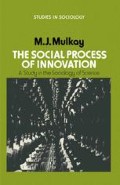Abstract
From the seventeenth to the middle of the twentieth century the number of those engaged in scientific research increased at an ever-faster rate in most Western societies. As their numbers expanded, so these men and their special knowledge became more and more important for the achievement of practical goals, such as economic growth and success in war, and for the development of other intellectual spheres. In view of the rapid and cumulative growth of science and its great impact on thought and technology, it is surprising how little is known about the social processes whereby scientific information is generated, accepted as valid by the research community and, finally, passed on to the wider society. One important reason for the lack of systematic knowledge in this area is that reference to the way in which ideas develop is rigorously suppressed in scientific textbooks and even more so in the papers presented to professional journals.1 Another factor is that researchers trained in nonscientific disciplines find it difficult to understand the intellectual complexities of modern science; while scientists themselves, although less harassed by this difficulty, are seldom willing to devote much effort to the detailed study of their own and their colleagues’ professional activities.
Author information
Authors and Affiliations
Copyright information
© 1972 British Sociological Association
About this chapter
Cite this chapter
Mulkay, M.J. (1972). Introduction. In: The Social Process of Innovation. Studies in Sociology. Palgrave, London. https://doi.org/10.1007/978-1-349-01450-7_1
Download citation
DOI: https://doi.org/10.1007/978-1-349-01450-7_1
Publisher Name: Palgrave, London
Print ISBN: 978-0-333-13431-3
Online ISBN: 978-1-349-01450-7
eBook Packages: Palgrave Social & Cultural Studies CollectionSocial Sciences (R0)

